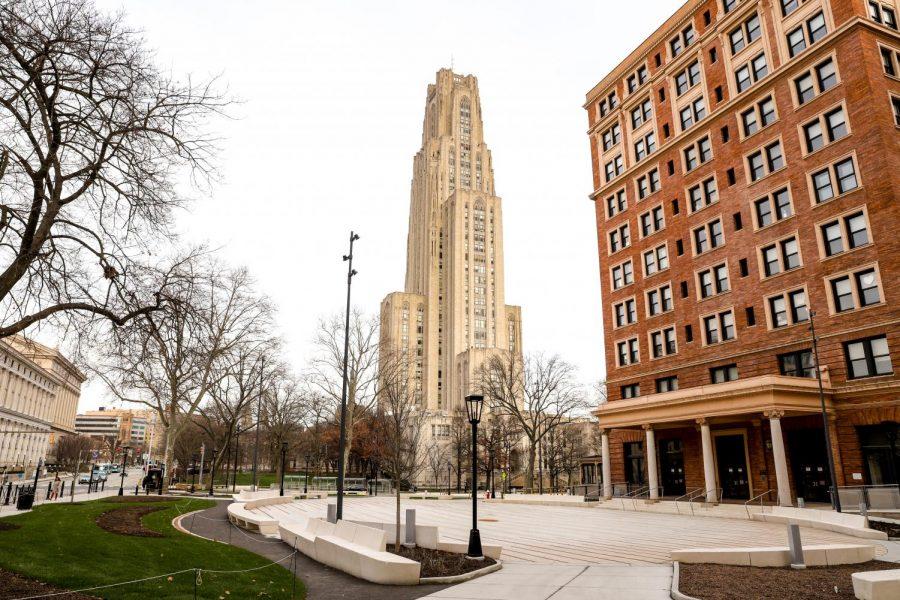New Pitt budget includes increases in tuition, operating costs


The Cathedral of Learning.
On Wednesday morning, Pitt’s Executive Committee and University Planning and Budget Committee approved the University’s operating and capital budgets for the upcoming year. Among the approved changes include increases to tuition, staff minimum wage, and University operating costs.
Hari Sastry, Pitt’s Senior Vice Chancellor and Chief Financial Officer, presented the budgets, saying they went through “a deliberative process within the University, including input from senior leadership, board members, and the shared governance of our University Planning and Budgeting Committee whose members include faculty, staff, and student representatives.”
The committees announced tuition increases for all undergraduate students at the Pittsburgh campus and all graduate students. Tuition will be increased by 2% for in-state undergraduates, 7% for out-of-state undergraduates, and 3.5% for all graduate students. Tuition will not be increased at Pitt’s regional campuses. According to an email sent by Sastry to University members, these tuition increases will, on average, cost in-state and out-of-state undergraduates an extra $197 and $1,260 per semester, respectively. For graduate students, the increased tuition translates to, on average, an additional $436 per term for in-state students and $740 per term for out-of-state students.
“At the University of Pittsburgh, students guide our daily mission, and we are certainly cognizant of the burden of higher education costs at Pitt and throughout the nation,” newly-appointed Chancellor Joan T.A. Gabel wrote in an email sent to University members shortly after the budgets were approved. “We will continue to work diligently to control this burden while elevating financial assistance and overall quality.”
These tuition increases come after the state legislature again failed to pass a bill earlier this month to provide Pitt with money that would offer in-state students discounted tuition. Discussion regarding state-related appropriations is ongoing, however, lawmakers aren’t scheduled to return to Harrisburg until the end of September.
“Even in the absence of a state appropriation, we recognize the importance of providing certainty to all aspects of our university operations, especially our students and families and our faculty and staff,” said Sastry. “We remain hopeful that the commonwealth will support the governor’s proposed increase, which has been incorporated into our budget.”
“While there remains some uncertainty regarding the state allocation, we believe it is imperative for our students and their families to know tuition rates for the 2023-24 academic year, and for our faculty and staff to be able to plan accordingly regarding their compensation,” wrote Gabel.
Housing costs will increase by 10% and meal plan prices will rise by 6.7%, a decision that Sastry says reflects “competitive market rates and inflation.”
The committees also approved a $3 billion operating budget, an 8.4% increase from last year’s operating budget of $2.7 billion, a capital budget of $389.9 million, and a projected research base of $1.2 billion.
“At Pitt, we remain focused on carefully managing expenses, especially given significant rates of inflation and pandemic costs over the last few years,” said Sastry. “Our goal is always to maintain a world-class education in research standards, attract and retain the best faculty and staff, and continue to have a positive impact on our community and the commonwealth. By having a comprehensive budget in place, we can better plan and allocate resources, ensuring a smoother, more effective academic year ahead.”
Other budget changes include a salary pool increase of 4% and a minimum wage increase to $16.50 per hour for university staff. Pitt spokesperson Chuck Finder clarified that the compensation pool increase is only for faculty and staff members without union representation and the minimum wage increase applies for any staff member earning less than the newly adopted minimum wage.
“With regard to faculty and staff, the culture of collaboration and community that they have helped to create through their dedication and strong work ethic is one of the reasons I joined Pitt,” Gabel wrote. “Recognizing these invaluable contributions, it is paramount that we provide a competitive salary pool, and we are committed to reaching a fair and equitable agreement with represented faculty.”
As he concluded the budget proposal, Sastry acknowledged how this budget will affect the University as a whole.
“We are committed to assessing our costs and looking for new ways to reduce expenses while also investing in critical strategic priorities to advance the Plan for Pitt. I believe our fiscal year 2024 operating and capital budgets reflect our commitment to our dedicated faculty and staff, as well as to the students of this great university,” said Sastry.
Recent Posts
Opinion | School should be in the summer
Although this may be controversial, I believe that from this data, it is evident that…
Weathering the storm: Pittsburgh teams have tackled some of the toughest environments
The end of the year in western Pennsylvania is always marked by two things —…
Notes From an Average Girl // Notes on Book Banning
In this edition of Notes From an Average Girl, senior staff writer Madeline Milchman writes…
To Be Honest // Yup, it is that damn phone
In this edition of To Be Honest, staff writer Evin Verbrugge writes about her phone…
Meaning at the Movies | Portraying Toxic ‘Adolescence’
In this edition of Meaning at the Movies, staff writer Lauren Deaton explores the mini-series…
Opinion | Climate change requires radical, immediate action
Contributing editor Emma Hannan talks about the effects of climate change and the actions cities…

